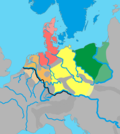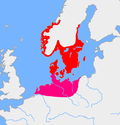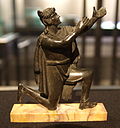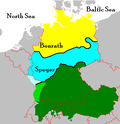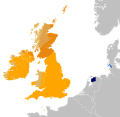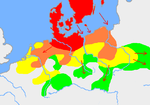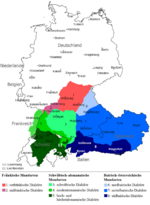The Germanic languages are a branch of the Indo-European language family spoken natively by a population of about 515 million people mainly in Europe...
93 KB (9,514 words) - 08:54, 28 July 2024
The West Germanic languages constitute the largest of the three branches of the Germanic family of languages (the others being the North Germanic and the...
56 KB (4,764 words) - 18:07, 24 July 2024
The North Germanic languages make up one of the three branches of the Germanic languages—a sub-family of the Indo-European languages—along with the West...
57 KB (5,429 words) - 00:05, 27 July 2024
East Germanic is one of the primary branches of Germanic languages, along with North Germanic and West Germanic. The only East Germanic language of which...
9 KB (917 words) - 19:51, 29 May 2024
The Germanic languages include some 58 (SIL estimate) languages and dialects that originated in Europe; this language family is part of the Indo-European...
15 KB (1,110 words) - 20:32, 12 June 2024
Proto-Germanic (abbreviated PGmc; also called Common Germanic) is the reconstructed proto-language of the Germanic branch of the Indo-European languages. Proto-Germanic...
130 KB (12,136 words) - 12:36, 5 August 2024
which there are eight groups with languages still alive today: Albanian, Armenian, Balto-Slavic, Celtic, Germanic, Hellenic, Indo-Iranian, and Italic;...
112 KB (10,231 words) - 23:18, 10 August 2024
North Sea Germanic, also known as Ingvaeonic (/ˌɪŋviːˈɒnɪk/ ING-vee-ON-ik), is a postulated grouping of the northern West Germanic languages that consists...
10 KB (1,100 words) - 19:37, 10 August 2024
linguistics, was too inaccurate to describe the relation between the modern Germanic languages, especially those belonging to its Western branch. Rather than depicting...
6 KB (513 words) - 14:38, 27 March 2024
The Germanic parent language (GPL), also known as Pre-Germanic Indo-European (PreGmc) or Pre-Proto-Germanic (PPG), is the stage of the Germanic branch...
11 KB (1,249 words) - 18:46, 12 July 2024
[of Germanic names] seems to be an inherited, Indo-European trace, which the Germanic languages share with Greek and other Indo-European languages." One...
163 KB (20,188 words) - 08:13, 7 August 2024
The Germanic substrate hypothesis attempts to explain the purportedly distinctive nature of the Germanic languages within the context of the Indo-European...
19 KB (2,101 words) - 06:46, 1 August 2024
took place separately in various Germanic languages starting around 450 or 500 CE and affected all of the early languages except Gothic. An example of the...
54 KB (5,348 words) - 07:40, 29 June 2024
High German consonant shift (redirect from High Germanic languages)
8th century. The shift distinguishes High German from other West Germanic languages, which did not experience the shift. The degree that the shift was...
31 KB (2,784 words) - 16:28, 11 August 2024
Frisian) varieties of the West Germanic languages. The Anglo-Frisian languages are distinct from other West Germanic languages due to several sound changes:...
25 KB (1,789 words) - 15:52, 1 August 2024
of the Germanic languages List of ancient Germanic peoples and tribes Germanic languages Proto-Germanic language, a reconstructed proto-language of all...
797 bytes (121 words) - 17:25, 11 December 2021
themselves evolved into the modern North Germanic languages (Faroese, Icelandic, the Continental Scandinavian languages, and their dialects). Proto-Norse phonology...
22 KB (2,290 words) - 16:07, 13 July 2024
mainly Romance, languages. As a Germanic language, Gothic is a part of the Indo-European language family. It is the earliest Germanic language that is attested...
91 KB (10,145 words) - 13:47, 8 August 2024
research into the Germanic languages began in the 16th century, with the discovery of literary texts in the earlier phases of the languages. Early modern...
4 KB (356 words) - 21:40, 9 March 2024
Low German (redirect from Low Germanic language)
Frisian and English, with which it forms the North Sea Germanic group of the West Germanic languages. Like Dutch, it has historically been spoken north of...
114 KB (8,183 words) - 05:54, 10 August 2024
divided into North, West and East Germanic groups, and ultimately produced a large group of mediaeval and modern languages, most importantly: Danish, Norwegian...
29 KB (2,932 words) - 13:50, 18 June 2024
from a Germanic tribal and linguistic continuum along the Frisian North Sea coast, whose languages gradually evolved into the Anglic languages in the...
226 KB (23,110 words) - 02:41, 11 August 2024
*Frenkisk), also known as Old Franconian or Old Frankish, was the West Germanic language spoken by the Franks from the 5th to 9th century. After the Salian...
59 KB (4,839 words) - 14:17, 21 July 2024
Northwest Germanic is a proposed grouping of the Germanic languages, representing the current consensus among Germanic historical linguists. It does not...
10 KB (1,202 words) - 21:45, 10 July 2024
Upper German (redirect from Upper Germanic languages)
Study of New High German. (Publications of the University of Manchester: Germanic Series: No. II.) Manchester, 1948, p. 30; also Manchester, 1923, p. 11...
28 KB (2,893 words) - 12:41, 13 May 2024
Continental Germanic mythology. It was a key element of Germanic paganism. As the Germanic languages developed from Proto-Indo-European language, Germanic mythology...
9 KB (973 words) - 19:50, 30 July 2024
proto-languages. North Sea Germanic Weser–Rhine Germanic Stefan Müller, Germanic syntax: A constraint-based view, series: Textbooks in Language Sciences...
6 KB (483 words) - 05:42, 13 May 2024
In the Germanic languages, a strong verb is a verb that marks its past tense by means of changes to the stem vowel. The majority of the remaining verbs...
126 KB (12,239 words) - 13:14, 22 July 2024
form the North Sea Germanic languages. However, modern English and Frisian are not mutually intelligible, nor are Frisian languages intelligible among...
33 KB (3,465 words) - 20:17, 28 July 2024
A pan-Germanic language is a zonal auxiliary language designed for communication amongst speakers of Germanic languages. Many of them are very similar...
4 KB (444 words) - 05:55, 2 July 2024




